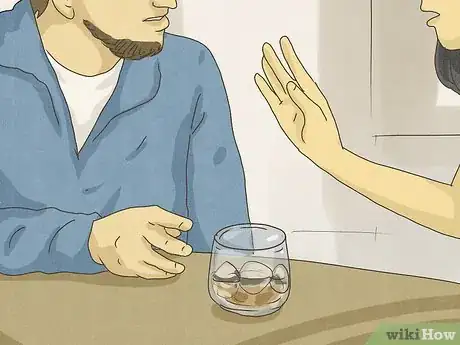This article was co-authored by Tala Johartchi, PsyD and by wikiHow staff writer, Dan Hickey. Dr. Tala Johartchi is a Clinical Psychologist based in the Los Angeles, California metro area. With expertise and advanced training in Evidence-Based Practices and therapeutic/behavioral frameworks, Dr. Johartchi specializes in working with individuals, couples, and families experiencing Substance Disorders, Love Addiction and Codependency, Post Traumatic Stress Disorder, as well as common co-occurring disorders such as Depression, Anxiety, and Relational/Attachment difficulties. She earned an MA and PsyD in Clinical Psychology from The American School of Professional Psychology at Argosy University, San Francisco.
There are 7 references cited in this article, which can be found at the bottom of the page.
This article has been viewed 6,912 times.
It’s hard not to feel helpless, frustrated, and heartbroken when your boyfriend is struggling with alcohol abuse and your relationship is strained. You can’t force him to get sober — that decision belongs to him — but there is a lot you can do and say as his partner to help him make healthy choices and stay sober long term while also taking care of your own needs. We’ve put together a list of the most important steps you can take to help stop your boyfriend from drinking.
Steps
Identify signs of alcohol abuse in your relationship.
-
Alcohol abuse can put a strain on your relationship. His drinking may lead to arguing or conflict, which can lead to even stronger impulses to drink. Recognizing the signs of abuse and pointing them out to your boyfriend can help open the door for a meaningful conversation about his drinking. [1] X Research source Some signs include:
- Arguing related to his drinking
- Covering up or hiding his drinking from friends and family
- Drinking to reduce relationship stress
- Domestic violence
- Drinking in order to show affection
Identify signs of alcohol abuse in his personal life.
-
Alcohol abuse can also take a toll on your boyfriend’s personal life. Every person responds to alcohol differently and there is no clean line between normal and problematic drinking. If alcohol is affecting his day-to-day life and health, it’s time to start a conversation around his drinking.[2] X Trustworthy Source HelpGuide Nonprofit organization dedicated to providing free, evidence-based mental health and wellness resources. Go to source Some signs include:
- Neglecting work or home responsibilities because of drinking or hangovers
- Binge drinking or drinking more than intended
- Lying about or covering up the amount that he drinks
- Blacking out
- Continuing to drink even when it’s causing problems
- Self-medicating to cope with anxiety, depression, or bipolar disorder
Pick the right time to talk.
-
Wait until you are both in a good mental space for a meaningful talk. Don’t confront him about his alcohol use late at night if he’s already been drinking, or early in the morning if he’s hungover. Make sure alcohol is not present for any part of your discussion.[3] X Research source
- Try talking while doing a quiet activity you both enjoy together, like going for a walk or playing a board game. This will give him easy opportunities to pivot the conversation if he’s not ready to have it and minimize the chance of emotional outbursts. Plus, the quality time will help build trust that you have his best interests at heart.[4] X Research source
Initiate the conversation.
-
Ask him if he has time to talk. This is your time to express yourself and take the first step toward recovery together. Tell him how you feel when he drinks and ask if there is anything you can do to help or support him. Mentioning a recent incident with alcohol is a good way to begin the conversation if you’re unsure where to start.[5] X Research source Some possible conversation starters include:
- “Are you worried about your drinking?”
- “I’m worried about your drinking.”
- “Do you drink more than you mean to sometimes?”
- “I’ve noticed you’ve been drinking more frequently lately.”
Be patient.
-
It may take more than one conversation before he decides to seek help. This is normal and it can take weeks or months before he is ready to change or admit that he has a problem. If he’s not ready, wait for another good moment to bring it up again and let him know you’re still concerned.[6] X Research source
- End each talk with ”I’m always here if you do want to talk about it” to show your support and keep the door open for future conversations.[7] X Research source
- Don’t push the issue or start an argument if he is not ready to talk. Let the situation breath and use the downtime between conversations to reach out to an addiction professional or research support services for him or yourself.[8] X Research source
Be sensitive.
-
Your boyfriend did not develop a drinking problem on purpose. Alcohol marketing and social norms around excessive drinking make it easy to fall into bad habits, especially if he is already under stress.[9] X Expert Source

Clinical Psychologist Expert Interview. 16 July 2021. Give him the chance to tell you his feelings by asking open questions that start with “what,” “why,” “when,” “how,” or “who.”[10] X Research source- For example, “Why did you feel the need to drink so much last night?” will draw a more detailed and emotional answer from him than “Did you mean to drink that much?”
- You can also phrase your questions as statements to get a conversation going. Try something like, “Tell me how you feel when you decide to start drinking.”
- Avoid asking simple “yes” or “no” questions. He’s less likely to open up and may feel interrogated instead of cared for.
Prepare for pushback.
-
It’s common for people to dismiss concerns about their drinking. He may get angry or defensive when the topic comes up, or try to laugh it off and downplay the seriousness.[11] X Research source If he shuts down your concerns because he doesn’t believe he has a problem, show him how his alcohol use is impacting his life and your relationship with specific examples of when his drinking led to arguments, injuries, legal trouble, or other problems.[12] X Trustworthy Source Harvard Medical School Harvard Medical School's Educational Site for the Public Go to source
- Calmly acknowledge his feelings while expressing your concern if he dismisses you. Try something like, “I understand you don’t want to hear about this right now, but I want you to know that I’m still worried about you.”
- Don’t take a negative reaction personally. Give him time to process your concerns and try again later.[13] X Trustworthy Source HelpGuide Nonprofit organization dedicated to providing free, evidence-based mental health and wellness resources. Go to source
Focus on the drinking.
-
Don’t mix other issues or heavy emotions into your conversation. Stay calm and zero in on his drinking habits and your concern for his well being. He might already feel guilty or anxious about his behavior, and hurling blame or accusations at him might make his compulsions to drink worse.[14] X Trustworthy Source HelpGuide Nonprofit organization dedicated to providing free, evidence-based mental health and wellness resources. Go to source
Be consistent.
-
Don’t send mixed messages about your concerns. If you tell him you’re worried about his drinking but then have a happy hour cocktail with him after work, he’s going to be confused and take your conversations about it less seriously. It’s best not to drink at all around him.[15] X Research source
Focus on his health.
-
Tell him you’re concerned with his wellbeing. Severe alcohol abuse can cause a variety of long term health problems, like liver and heart disease, and can even lead to shortened life expectancy or death. Focusing on something tangible and personal to him, like his health, shows you’re genuinely worried and will help him trust you on his road to recovery.[16] X Research source
- Tell him something like, “I’m worried that you’re hurting yourself by drinking so much. I want you to be alive and healthy for as long as possible.”
- Watching his health stats improve can also be a huge motivator for him to stay sober and continue making healthy choices.
Don't cover up for him.
-
He needs to see the negative consequences of his drinking. Shielding him from responsibilities or consequences will only enable his behavior and help him put off the decision to get help even longer. Support him in his journey to sobriety, but don’t take responsibility for his actions.[17] X Trustworthy Source HelpGuide Nonprofit organization dedicated to providing free, evidence-based mental health and wellness resources. Go to source
- It’s normal to want to protect someone you love from embarrassment or harm. Remember that he is the only one responsible for his behavior, and it is up to him to change.[18] X Research source
Plan an intervention if you need support.
-
Reach out to friends and family members that share your worries. Plan a time to talk to him together in a comfortable and private space where everyone can speak freely. Everyone should share specific examples of how his drinking has impacted them and collectively offer a treatment solution, like a doctor visit, a self-help group, behavioral therapy, or inpatient rehab.[19] X Trustworthy Source Mayo Clinic Educational website from one of the world's leading hospitals Go to source
- It’s vital that everyone involved is coming from a place of concern and doesn’t use the opportunity to vent or erupt at your boyfriend. Make a plan of what to say together and ask everyone to stick to the plan.
- If you’re not confident planning the meeting yourself, consult an addiction specialist beforehand for advice or even to run the meeting.
Don’t blame yourself.
-
You did not make your boyfriend drink. You are not guilty or responsible for his behavior. You can’t force him to change. Alcohol addiction is a complex disorder with many overlapping physical and emotional causes.[20] X Expert Source

Clinical Psychologist Expert Interview. 16 July 2021. You can support him, but it’s up to him to recognize the negative impact of his drinking and to take the right steps to get sober.[21] X Trustworthy Source HelpGuide Nonprofit organization dedicated to providing free, evidence-based mental health and wellness resources. Go to source
Take care of yourself.
-
You can support him the best when you feel like your best self. Attend to your own needs, give yourself time to manage stress and practice self-care, and ask for help from friends, family, or a professional if you need it.[22] X Expert Source

Clinical Psychologist Expert Interview. 16 July 2021. You don’t have to help him all by yourself.[23] X Trustworthy Source HelpGuide Nonprofit organization dedicated to providing free, evidence-based mental health and wellness resources. Go to source- Support your own mental health by communicating your feelings, making healthy choices, and celebrating your small wins.[24] X Research source
- There are support groups and resources available for people struggling with a loved one’s alcohol use. Reach out to an addiction professional, your doctor, or your therapist for recommendations.[25] X Research source
Be encouraging.
-
Keep showing your support after he decides to get sober. Go with him to doctor appointments, support groups, or counseling appointments (if you’re allowed). Sit with him while he researches treatment options or calls a helpline. Be a part of his recovery plan and help him decide how to make the changes he needs to improve his life and your relationship.[26] X Trustworthy Source HelpGuide Nonprofit organization dedicated to providing free, evidence-based mental health and wellness resources. Go to source
Support his new lifestyle.
-
Your boyfriend will have to make major adjustments to live sober. Explore new hobbies with him, join him at sober social activities, and help him find healthy ways to manage stress, like journaling or exercise. Your love and support will help keep him on track as he builds a stable, sober life and addresses the issues that caused his alcohol abuse to begin with.[27] X Trustworthy Source HelpGuide Nonprofit organization dedicated to providing free, evidence-based mental health and wellness resources. Go to source
- Be prepared for relapses and hard moments. The road to recovery is not a straight line, and you shouldn’t blame yourself for any setbacks he experiences along the way.
You Might Also Like

 Signs Your Ex Will Eventually Come Back
Signs Your Ex Will Eventually Come Back


 What Are the Bases in a Relationship? Defining the Baseball-Sex Metaphor
What Are the Bases in a Relationship? Defining the Baseball-Sex Metaphor
 The Top Emojis a Girl Will Use if She Likes You
The Top Emojis a Girl Will Use if She Likes You
 How to Tell if Your Girlfriend Is Horny: 12 Signs She's Turned On
How to Tell if Your Girlfriend Is Horny: 12 Signs She's Turned On
 What to Do When Your Girlfriend Is Mad at You (10+ Steps to Take)
What to Do When Your Girlfriend Is Mad at You (10+ Steps to Take)
 12+ Texts to Send Your Girlfriend After a Fight: Apologies & More
12+ Texts to Send Your Girlfriend After a Fight: Apologies & More
 How to Have Phone Sex with Your Girlfriend
How to Have Phone Sex with Your Girlfriend

 33 Sweet & Romantic Apology Messages for Your Love
33 Sweet & Romantic Apology Messages for Your Love

 12 Ways to Break a Narcissist's Heart
12 Ways to Break a Narcissist's Heart
References
- ↑ https://www.aamft.org/Consumer_Updates/Substance_Abuse_and_Intimate_Relationships.aspx
- ↑ https://www.helpguide.org/articles/addictions/helping-someone-with-a-drinking-problem.htm
- ↑ https://www.alcohol.org.nz/help-advice/ease-up-on-the-drink/how-to-talk-to-someone-about-their-drinking
- ↑ https://ahauk.org/what-to-do-when-you-are-worried-about-your-partners-drinking/
- ↑ https://www.alcohol.org.nz/help-advice/ease-up-on-the-drink/how-to-talk-to-someone-about-their-drinking
- ↑ https://www.alcohol.org.nz/help-advice/ease-up-on-the-drink/how-to-talk-to-someone-about-their-drinking
- ↑ https://ahauk.org/what-to-do-when-you-are-worried-about-your-partners-drinking/
- ↑ https://www.alcohol.org.nz/help-advice/ease-up-on-the-drink/how-to-talk-to-someone-about-their-drinking
- ↑ Tala Johartchi, PsyD. Clinical Psychologist. Expert Interview. 16 July 2021.
- ↑ https://ahauk.org/what-to-do-when-you-are-worried-about-your-partners-drinking/
- ↑ https://www.alcohol.org.nz/help-advice/ease-up-on-the-drink/how-to-talk-to-someone-about-their-drinking
- ↑ https://www.health.harvard.edu/blog/heavy-drinkers-arent-necessarily-alcoholics-may-almost-alcoholics-201411217539
- ↑ https://www.helpguide.org/articles/addictions/helping-someone-with-a-drinking-problem.htm
- ↑ https://www.helpguide.org/articles/addictions/helping-someone-with-a-drinking-problem.htm
- ↑ https://www.alcohol.org.nz/help-advice/ease-up-on-the-drink/how-to-talk-to-someone-about-their-drinking
- ↑ https://ahauk.org/what-to-do-when-you-are-worried-about-your-partners-drinking/
- ↑ https://www.helpguide.org/articles/addictions/helping-someone-with-a-drinking-problem.htm
- ↑ https://ahauk.org/what-to-do-when-you-are-worried-about-your-partners-drinking/
- ↑ https://www.mayoclinic.org/diseases-conditions/mental-illness/in-depth/intervention/art-20047451
- ↑ Tala Johartchi, PsyD. Clinical Psychologist. Expert Interview. 16 July 2021.
- ↑ https://www.helpguide.org/articles/addictions/helping-someone-with-a-drinking-problem.htm
- ↑ Tala Johartchi, PsyD. Clinical Psychologist. Expert Interview. 16 July 2021.
- ↑ https://www.helpguide.org/articles/addictions/helping-someone-with-a-drinking-problem.htm
- ↑ https://ahauk.org/what-to-do-when-you-are-worried-about-your-partners-drinking/
- ↑ https://www.aamft.org/Consumer_Updates/Substance_Abuse_and_Intimate_Relationships.aspx
- ↑ https://www.helpguide.org/articles/addictions/helping-someone-with-a-drinking-problem.htm
- ↑ https://www.helpguide.org/articles/addictions/helping-someone-with-a-drinking-problem.htm
About This Article





























































